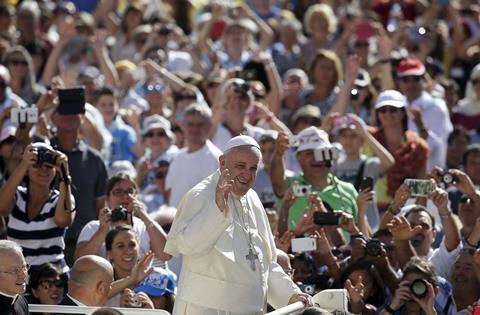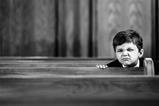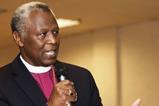The head of the 1.3 billion-strong Catholic Church recently celebrated ten years of leadership, but what difference has a new approach from the ’Bishop of Rome’ really made? Tim Wyatt reports

“The church must always go forward, it must continually grow. This way it stays young. It is only thanks to the Spirit that one can receive Christ’s mission and carry it out…the Spirit is the engine of evangelisation.” These words are not from Holy Trinity Brompton’s Nicky Gumbel, Bethel’s Bill Johnson, or any other charismatic megapastor or evangelist. Instead, they were spoken earlier this year inside the Vatican by Pope Francis during his weekly sermon.
The pontiff’s heart for Spirit-soaked witness is not a recent interest either. Later this month he will lead the 1.3 billion strong Catholic Church in taking part in the eighth year of Thy Kingdom Come – the annual prayer movement for evangelism between Ascension and Pentecost started by the Archbishop of Canterbury in 2016. Led by his example, Catholic parishes across Britain and the world will pray for their non-Christian friends to come to know Jesus. In 2020, during Thy Kingdom Come, which fell at the height of the first Covid lockdown, the Pope urged those taking part to “give in turn the gift that we have received… and become messengers of the comfort bestowed by the Spirit. Let us radiate hope”.
A Church for the poor
A passion for evangelism is one of many things that have marked out Pope Francis’ ten-year pontificate as a decisive break from his predecessors. Reflecting on his decade on the Chair of St Peter, Christopher Lamb – Vatican correspondent for The Tablet and a biographer of Francis – said the Pope had radically changed the culture of the Vatican. He often quotes from Revelation where it says that Jesus stands and knocks at the door to come in, Lamb said. Francis complains that far too often Jesus is actually inside the church, asking to get out. “And so the whole approach of Francis is to put everything onto a missionary, evangelising key. And to be outward-looking and end this self-referential attitude.”
Francis’s desire to open the Catholic Church up in evangelism is mirrored by his instincts towards other kinds of openness – towards the poor, the Global South, refugees, the exploited and excluded. Paul Vallely, another Catholic commentator and biographer of the Pope, said one of the biggest shifts Francis had brought about over the last ten years was his call for “a poor church for the poor”. Rather than hoarding power in Rome and prioritising status and hierarchy, Argentinian Francis has sought to rebalance Catholicism towards those who, like him, are not from Western countries. “He’s very in favour of prioritising refugees and people who are alienated from the international economy,” Vallely said. “And part of his ecological work has echoes of that. He’s not just trying to save the planet because it’s part of God’s creation, he wants to change the way we use the resources of the planet, because they’re part of the way that the rich exploit the poor.”
It is this social radicalism that has alienated conservative elements in the Catholic Church, particularly in the United States, who have long waged a semi-covert struggle against this Pope and what they perceive as his dangerous reforms. But most ordinary Catholics support Francis, Vallelly added. “I think the vast majority of Catholics love him and think that he’s a real breath of fresh air. Instead of being the old-style pope with his finger out to wag, he’s a man with his arms open to embrace.”
Doctrinal flashpoints
But where does Francis stand on the core doctrinal controversies of the day? For the most part, he has held fast to the Catholic Church’s longstanding teaching on issues such as celibacy, women priests, abortion, contraception and sexuality. Lamb said he was not a theological liberal and had not changed any doctrines, in particular upholding Catholic opposition to abortion unflinchingly. But, it was fair to say that in the background he had tried to open up ossified doctrinal processes, allowing for the possibility of Church teaching developing over time.
For instance, he has launched commissions to explore the question of whether women could become deacons, which, according to some campaigners, could be a first step towards female priests in the future. “He’s not trying to do a PR exercise on unpalatable Catholic teachings, he is really trying to get to the heart of the message of the gospel and to translate that to the contemporary world,” Lamb argued. Vallely agreed, noting the Catholic Church was like a “super-tanker” and required years if not decades of work to turn around. “I think he has got liberal feelings but doctrinally he is orthodox.”
This can also be seen in his approach to sexuality, another flashpoint. Some liberal strands of the Church are keen to allow blessings for gay couples, which the Catholic Church has always prohibited. While Francis has not made any steps towards a change in rubric, he told reporters early in his papacy that he was not interested in scolding LGBT people for falling short of God’s ideal. “Who am I to judge?” he famously said when quizzed on his position on homosexuality.
As well as thrilling those campaigning for a more relaxed stance on sexuality, the Pope’s humility underlined his rejection of the hectoring and moralising associated with previous pontiffs, who very explicitly saw it as their role to uphold strict moral standards.
Similarly, Francis has endorsed a more forgiving and welcoming approach to family life, including endorsing Communion for Catholics who have got divorced and remarried, or are simply cohabiting with their partners – something Church doctrine prohibits. As Vallely explained it, the Pope believes not that Church teaching is wrong, but that applying it with “Christian charity and mercy and a willingness to forgive” is vital.
Ecumenism
Another remarkable aspect of Francis’s papacy has been his ability to extend friendship to other Christian denominations. Until relatively recently, the Catholic Church struggled to even recognise Anglicans, let alone Baptists, Methodists, Presbyterians or independent evangelicals, as fellow believers. Yet this pope has developed “alliances with other Christians” to the point where he is almost more popular with non-Catholics than his own flock, Lamb said.
He has built an especially close friendship with Most Rev Justin Welby, Archbishop of Canterbury, recently travelling with him and the Moderator of the Church of Scotland on a peacebuilding trip to South Sudan. “He’s really trying to build an alliance that goes outside of the confines of the Catholic Church,” the journalist said. “And that will be one of the big legacies that Francis leaves – that outward-looking approach for the Catholic Church.”
Vallely added that there had also been new ground broken in inter-religious dialogue, visiting countries that no pope had ever been to before – and in particular, working with senior figures in both Sunni and Shia Islam. This was notable given how strained Catholic-Muslim relations had been for a time under Francis’s predecessor, Benedict XVI, after he had quoted in a speech a medieval Byzantine emperor calling Muhammad’s teaching “evil and inhuman” (he later apologised).
Most Catholics think tackling child abuse hasn’t been a top priority for Francis
But regarding the most urgent problem in his in-tray when he entered the Vatican a decade ago, Francis has fallen short. When it comes to addressing the child abuse crisis, the Pope has struggled to make much difference. “At the beginning of his pontificate his response was not good enough,” Lamb said bluntly. There was an early crisis with abuse in Chile, next door to his home country of Argentina, which Francis had been far too slow to deal with properly. Later, he established a Commission for the Protection of Minors at the Vatican, but the two survivors of abuse he invited to join quit after a few years in protest at its inaction.
Over time, the Pope has started to get to grips with the scale of the issue, promulgating tougher church-wide laws on holding bishops accountable for covering up abuse and spending more time listening to abuse survivors who have been poorly treated by Catholic institutions, Lamb added. “Most Catholics think that it still hasn’t really been a top priority of his,” Vallely said. Yes, his more pastoral approach to survivors was a welcome breath of fresh air, but there remains a feeling among ordinary churchgoers that he has not done enough.
Although increasingly hampered by illness and now age, Francis, 86, has not given any indication he intends to follow the unprecedented example of his predecessor and resign the papacy soon. With sweeping reforms still rolling out across the Vatican and in church decision-making, there remains much to do, Vallely said. “The Francis pontificate will always be something that is a work in progress”, Lamb agreed. “I don’t think it ever will be complete because what Francis has done is opened processes. He has started things that are going to continue beyond his pontificate.”





































No comments yet